If you would prefer to here an audio version of ‘Friendship During COVID-19’, please click play above.
Introduction:
Shut all retail. Shut all hospitality. Stop travel. Shut schools. Stay at Home. But don’t forget to check in on your friends?
Since the start of the pandemic in 2020, the strength of friendships has been tested. With the majority of places closed and unable to physically meet each other, a mental health crisis was becoming even more prevalent (Young Minds 2021). Research suggests that depression and anxiety grew to be highest among young people (Nuffield Foundation 2020) with more than a quarter of people, in one study alone, classing themselves as lonely (Watson 2021). This emphasised the value placed upon friendship. As a 20-year-old student, my experience of friendship during COVID-19 was a struggle. Moving from in-person teaching to online, no more girls nights out more zoom calls in, and no more coffee trips. The effects the pandemic has had will last beyond its end, with its full impact not yet seen. This exhibition reflects my personal experience of friendship under COVID-19.
Photograph of a Friends Catch-Up in Lockdown:
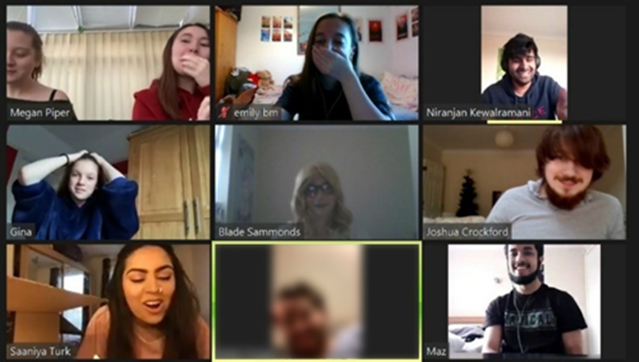
Photograph taken by Author
“What makes Captain America hot?” “Which Disney princess am I?” “Which dog would I be?” “What is the cross between a donkey and zebra known as?” These are a few of the questions that came up during weekly quizzes with my friends. Having to search for new ways to communicate during lockdown the online platform Zoom became the new place for ‘coffee catch-ups,’ ‘girls’ nights’, and more. Reaching 300 million users a day and offering free calls, its popularity peaked during the pandemic. These calls not only kept me close with my friends, who were spread across the country, but they helped me feel less isolated. As an escape to the uncertain world outside, online call platforms supported mental health by boosting our moods (Young Minds 2021). The most memorable part of these calls was the laughter and the joy that came from this. That is what I shall remember; that is what I shall always cherish.
Thank You NHS Homemade Posters:
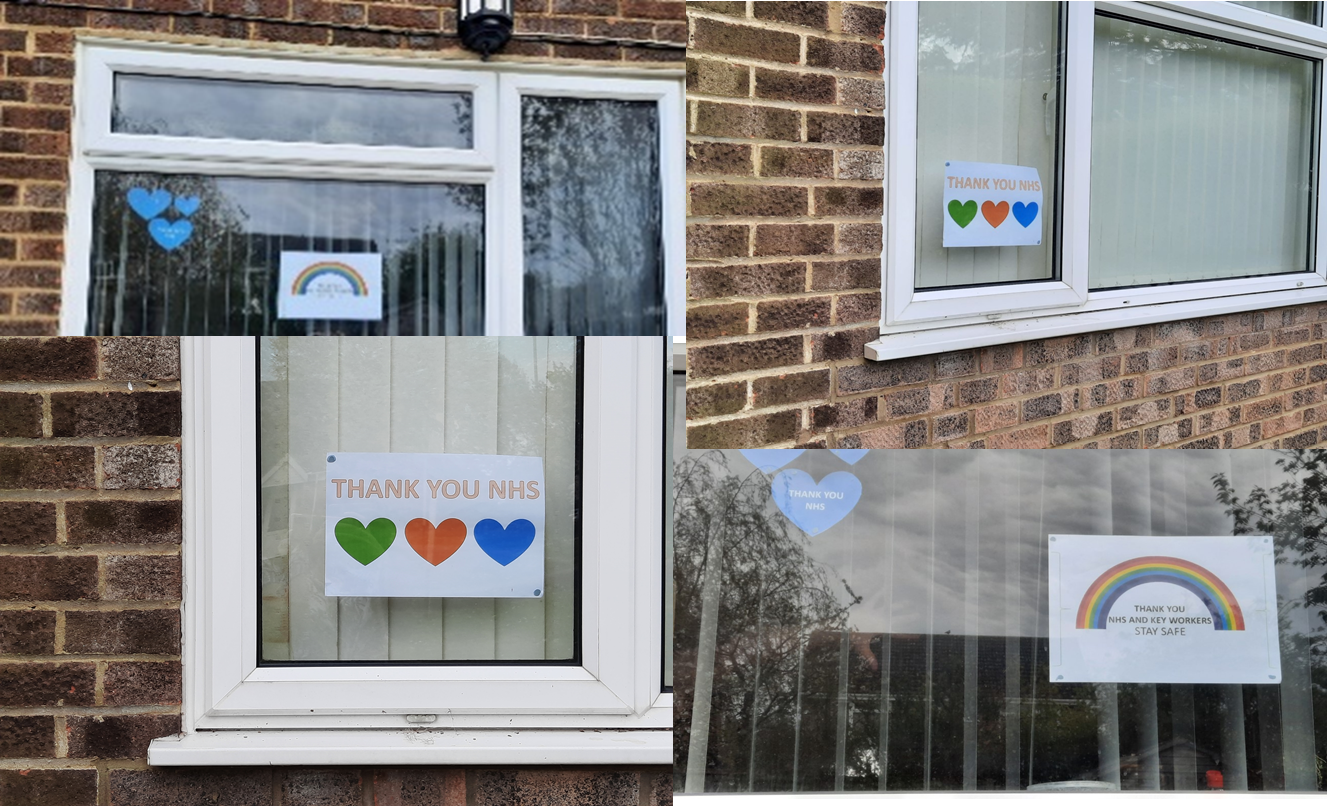
Set of Photographs taken by the Author
Throughout lockdown, one type of friendship that strengthened was the friendship between neighbours. The Clap for Carers, started by Annmarie Plas, saw everyone on their doorstops cheering and clapping to thank our NHS every Thursday at 8pm (Siddique 2021). The event created a greater feeling of community and togetherness. For me, I saw myself speaking to my neighbours more than ever before. Having never really fully interacted with many of my neighbours previously, it was a nice change. Next door’s daughter, only six years old, had struggled with not being able to see her friends. So, I tried to speak to her daily, whether it be about her toys, her puppy, or her trampoline. This unlikely friendship would not have happened had it not been for lockdown. But I am happy it did happen. If anything, I am now closer to my neighbours.
Birthday Cards:
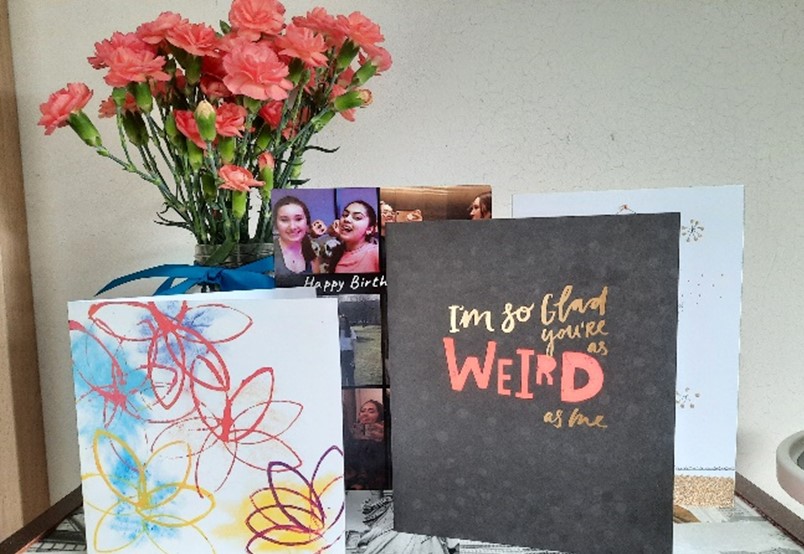
Photograph taken by the Author
Birthdays in lockdown, what an experience! Unable to celebrate birthdays together, the way we celebrated with friends changed dramatically. Birthday cards seemed more important than ever, with messages being extra special, personalised, and unique to me. If anything, the messages I received on my birthday made me feel comforted and less alone. Small actions, such as photo-covered cards, really made my birthday feel more memorable. A photo card from a close friend was covered with memories from our weekly Zumba sessions, clubbing, and dinner outings. The moments, we shared that I miss and all that we would be able to do again in the future, it caused me to reflect on our friendship. In a time when our birthdays were not quite how we expected them to be, personalised birthday cards became more cherished than a gift.
Phone Messages:
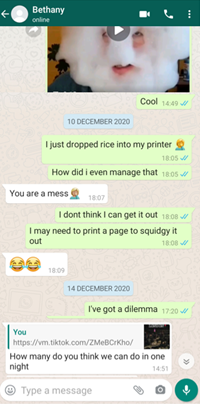
Image Taken by the Author
Over the last year I have lost friends as I am sure others have too; maybe we simply grew apart, maybe other friendships have become more prominent or maybe coronavirus has taken them from us. But thank goodness for technology! Without it, staying in touch with others would have been all the more difficult. Yes, some group chats stopped. One that did not slow but grew was my university friends’ WhatsApp group. Messages per hour went from 10 to almost 300 during the lockdown. We found that we were talking more than we used to in person. The way I messaged also changed with some of my closest friends, I started to communicate through simply emojis, mainly the laughing emoji and GIFS. Without phones, cameras, social media or the internet how would friendships have survived? I am sure that lockdown would have been a lot more difficult and placed great strain on friends than it already did.
Themed Saturday Evenings:
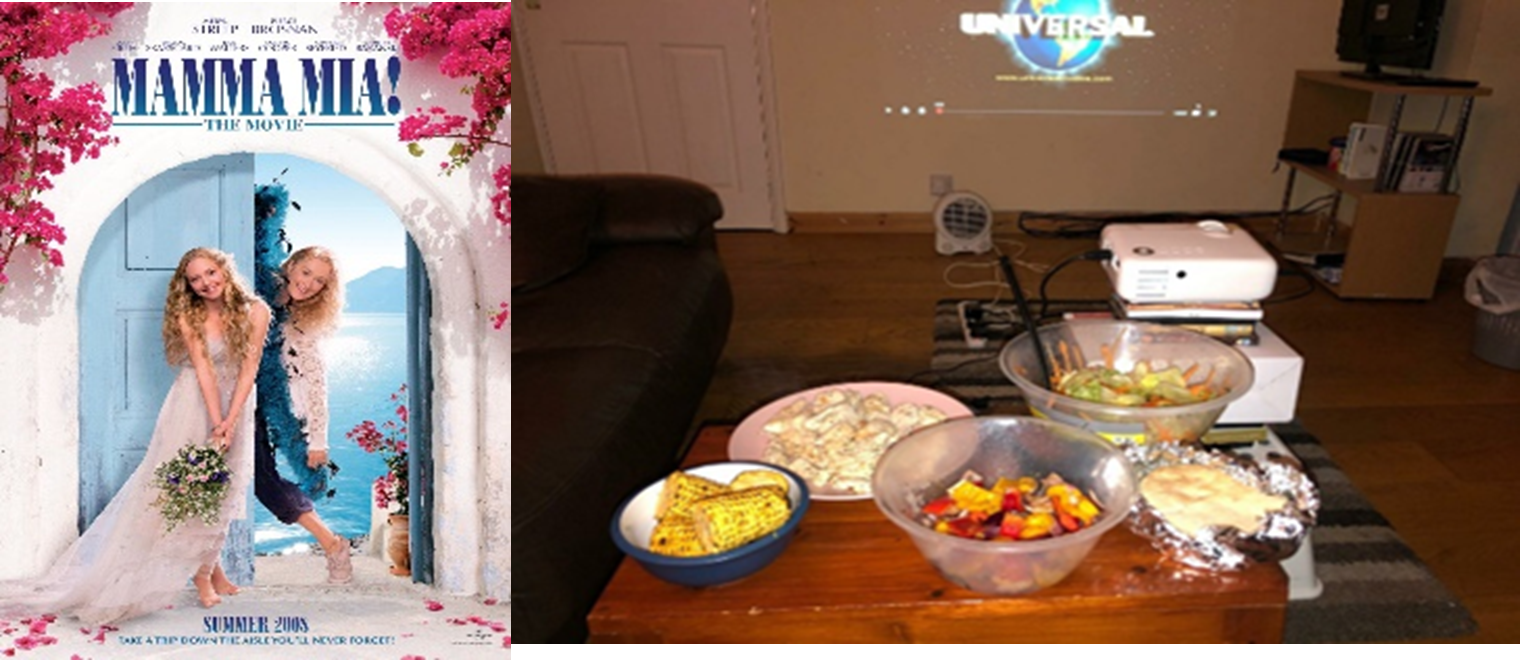
Left Image: https://www.joblo.com/movie-posters/2008/mamma- mia/image-20054/ Right Image: Photograph taken by Author
Social isolation and student life during lockdown has not been a good mix. Life has been difficult. That does not mean that my university house has not made the most of it. Themed Saturday evenings became our new nights out. The first night was Greek night. ‘Mamma Mia’ played on the projector and together we prepared a Greek feast. Although it was just a few of us, singing to ‘Dancing Queen’ in the living room, it did not sound like it. I am sure our neighbours appreciated our rendition of ‘Take a Chance on Me,’ luckily, we are in a detached house. These nights helped us cope with the isolation, being separated from our family, they boosted our moods, and brought us closer together as a house. If we had lived alone, our Saturday nights would have looked vastly different.
Visitor Activity: I would like to ask you all the question “What did you miss most about your friends during lockdown?”
Below offers some ideas:

Example Ideas. Created by author.
If you wish, go to the website mentioned, enter the code and see your experience appear in the ‘word cloud.’
Bibliography:
Haroon Siddique. “Woman behind UK ‘clap for carers’ announces its return.” The Guardian. https://www.theguardian.com/world/2021/jan/06/woman-behind-uk-clap-for-carers-announces-resume-thursday-annemarie-plas. (Accessed April 20, 2021).
Nuffield Foundation. 2020. “Friendships and relationships worsen during covid-19 lockdown.” Nuffield Foundation. https://www.nuffieldfoundation.org/news/friendships-and-relationships-worsen-during-covid-19-lockdown. (Accessed April 10, 2021).
Rebecca Watson. 2021. “Alone together: friendship in a pandemic.” Financial Times. https://www.ft.com/content/16f8495e-ca5e-4c47-add6-b69bf1b2fe36. (Accessed April 21, 2021).
Young Minds. 2021. “Coronavirus: Impact upon Young People with Mental Health Needs.” Young Minds. https://youngminds.org.uk/about-us/reports/coronavirus-impact-on-young-people-with-mental-health-needs/. (Accessed April 10, 2021).
